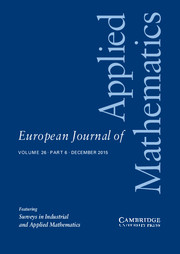Crossref Citations
This article has been cited by the following publications. This list is generated based on data provided by
Crossref.
Henao, Duvan
and
Majumdar, Apala
2012.
Symmetry of Uniaxial Global Landau--de Gennes Minimizers in the Theory of Nematic Liquid Crystals.
SIAM Journal on Mathematical Analysis,
Vol. 44,
Issue. 5,
p.
3217.
Pisante, Adriano
2014.
Symmetry in nonlinear PDEs: Some open problems.
Journal of Fixed Point Theory and Applications,
Vol. 15,
Issue. 2,
p.
299.
Chillingworth, D. R. J.
2016.
Perturbed hedgehogs: continuous deformation of point defects in biaxial nematic liquid crystals.
IMA Journal of Applied Mathematics,
Vol. 81,
Issue. 4,
p.
647.
Hu, Yucheng
Qu, Yang
and
Zhang, Pingwen
2016.
On the Disclination Lines of Nematic Liquid Crystals.
Communications in Computational Physics,
Vol. 19,
Issue. 2,
p.
354.
Canevari, Giacomo
Ramaswamy, Mythily
and
Majumdar, Apala
2016.
Radial symmetry on three-dimensional shells in the Landau–de Gennes theory.
Physica D: Nonlinear Phenomena,
Vol. 314,
Issue. ,
p.
18.
Majumdar, Apala
Milewski, Paul A.
and
Spicer, Amy
2016.
Front Propagation at the Nematic-Isotropic Transition Temperature.
SIAM Journal on Applied Mathematics,
Vol. 76,
Issue. 4,
p.
1296.
Everts, J. C.
Punter, M. T. J. J. M.
Samin, S.
van der Schoot, P.
and
van Roij, R.
2016.
A Landau-de Gennes theory for hard colloidal rods: Defects and tactoids.
The Journal of Chemical Physics,
Vol. 144,
Issue. 19,
Henao, Duvan
Majumdar, Apala
and
Pisante, Adriano
2017.
Uniaxial versus biaxial character of nematic equilibria in three dimensions.
Calculus of Variations and Partial Differential Equations,
Vol. 56,
Issue. 2,
An, Dong
Wang, Wei
and
Zhang, Pingwen
2017.
On equilibrium configurations of nematic liquid crystals droplet with anisotropic elastic energy.
Research in the Mathematical Sciences,
Vol. 4,
Issue. 1,
Ball, J. M.
2017.
Mathematics and liquid crystals.
Molecular Crystals and Liquid Crystals,
Vol. 647,
Issue. 1,
p.
1.
Ball, John M.
2017.
Mathematical Thermodynamics of Complex Fluids.
Vol. 2200,
Issue. ,
p.
1.
Lewis, A. H.
Aarts, D. G. A. L.
Howell, P. D.
and
Majumdar, A.
2017.
Revisiting the Two-Dimensional Defect-Free Azimuthal Nematic Equilibrium on an Annulus.
SIAM Journal on Applied Mathematics,
Vol. 77,
Issue. 6,
p.
1851.
Geng, Zhiyuan
Wang, Wei
Zhang, Pingwen
and
Zhang, Zhifei
2017.
Stability of half-degree point defect profiles for 2-D nematic liquid crystal.
Discrete & Continuous Dynamical Systems - A,
Vol. 37,
Issue. 12,
p.
6227.
Cai, Yongyong
Shen, Jie
and
Xu, Xiang
2017.
A stable scheme and its convergence analysis for a 2D dynamic Q-tensor model of nematic liquid crystals.
Mathematical Models and Methods in Applied Sciences,
Vol. 27,
Issue. 08,
p.
1459.
Majumdar, Apala
and
Wang, Yiwei
2018.
Remarks on uniaxial solutions in the Landau–de Gennes theory.
Journal of Mathematical Analysis and Applications,
Vol. 464,
Issue. 1,
p.
328.
Wang, Yiwei
Zhang, Pingwen
and
Chen, Jeff Z. Y.
2018.
Formation of three-dimensional colloidal crystals in a nematic liquid crystal.
Soft Matter,
Vol. 14,
Issue. 32,
p.
6756.
Shen, Jie
Xu, Jie
and
Yang, Jiang
2019.
A New Class of Efficient and Robust Energy Stable Schemes for Gradient Flows.
SIAM Review,
Vol. 61,
Issue. 3,
p.
474.
Yu, Yong
2020.
Disclinations in Limiting Landau–de Gennes Theory.
Archive for Rational Mechanics and Analysis,
Vol. 237,
Issue. 1,
p.
147.
Pisante, Adriano
2021.
Torus-like solutions for the Landau–De Gennes model..
Annales de la Faculté des sciences de Toulouse : Mathématiques,
Vol. 30,
Issue. 2,
p.
301.
Dipasquale, Federico
Millot, Vincent
and
Pisante, Adriano
2021.
Torus-like Solutions for the Landau-de Gennes Model. Part I: The Lyuksyutov Regime.
Archive for Rational Mechanics and Analysis,
Vol. 239,
Issue. 2,
p.
599.


